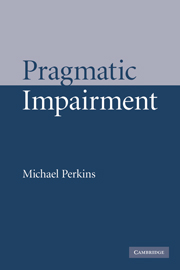Book contents
- Frontmatter
- Contents
- List of figures
- List of tables
- Acknowledgements
- Transcription conventions
- 1 Introduction
- 2 Pragmatic theory and pragmatic impairment
- 3 Pragmatics and modularity: components, dissociations and associations
- 4 Pragmatic ability and disability: an emergentist model
- 5 Cognition and pragmatics
- 6 Language and pragmatics
- 7 Sensorimotor systems and pragmatics
- 8 Compensatory adaptation
- 9 Conclusions
- Appendix
- References
- Index
5 - Cognition and pragmatics
Published online by Cambridge University Press: 22 September 2009
- Frontmatter
- Contents
- List of figures
- List of tables
- Acknowledgements
- Transcription conventions
- 1 Introduction
- 2 Pragmatic theory and pragmatic impairment
- 3 Pragmatics and modularity: components, dissociations and associations
- 4 Pragmatic ability and disability: an emergentist model
- 5 Cognition and pragmatics
- 6 Language and pragmatics
- 7 Sensorimotor systems and pragmatics
- 8 Compensatory adaptation
- 9 Conclusions
- Appendix
- References
- Index
Summary
Introduction
In this and the next two chapters I will consider the way a wide range of elements contributes to pragmatic processing by examining the communicative consequences of breakdown in each one individually. As pointed out earlier, however, the relationship between a specific underlying deficit and its behavioural consequences is not straightforward, and the way each element interacts with others will also be a primary focus. In addition, Chapter 8 will be devoted to the pervasive role played by compensatory adaptation. Any cognitive, semiotic or sensorimotor deficit has pragmatic consequences in that it limits the range of choices available for communication. In this chapter we will consider the way this operates in the domain of cognition.
The fact that pragmatics involves cognition is widely recognized, though in mainstream pragmatics this role is rarely explicitly targeted. In cases where it is (for example in Relevance Theory, where human cognition is seen as inherently ‘relevance-oriented’ (Sperber and Wilson, 1995)), the tendency is to focus on one or a narrow range of cognitive processes such as theory of mind. In language pathology research, on the other hand, there has been increasing interest in recent years in the relationship between cognitive dysfunction and pragmatic impairment, particularly in conditions such as right hemisphere brain damage, traumatic brain injury and autism (Martin and McDonald, 2003).
- Type
- Chapter
- Information
- Pragmatic Impairment , pp. 70 - 106Publisher: Cambridge University PressPrint publication year: 2007

